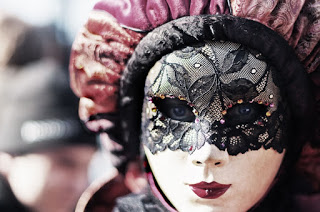OUR IMAGINARY LIFE IN THE OTHER
Some people more, others less, but we all live an
imaginary life before others. We have built a positive and pleasant image to
show the world. Doing this, we're not ourselves, we don't live ourselves. This
social face with which we relate to people is only a construction of ours,
because we do not want to reveal our true face. In moments of introspection, we
look at ourselves and become aware of our true self. But then we're back to the
imagination. Why does that happen?
French thinker Blaise Pascal wrote of this human
dysfunction: "we are not content with the life we have in us and in our
own being; we want to live an imaginary life in the imagination of others and,
to that end, we strive to pretend. We work incessantly to conserve and beautify
our imaginary being, neglecting the true ... the great mark of the emptiness of
our own being is not to be satisfied with one without the other and exchange
many times for each other" [1].
It is the profound change that happened in man's
being at the time of the Fall. Body, soul and spirit, which once existed
integrated, now find themselves misaligned. In general, the soul, dissatisfied
with the body, seeks to change it through diets, exercises and surgeries. It
desires a long and intense life, but the body does not correspond and
progresses on a trajectory that culminates in death. Disoriented, the human
soul makes a distorted reading of reality, because it does not know who it is,
where it comes from or where it goes. The spirit, in turn, separated from its
Creator, lives in anguish wishing to find Him again, for this separation
generated a amorphous condition of existence.
While Pascal spoke of an "emptiness" in
man, stemming from the Fall, St Augustine commented on an "abyss".
" God, light of my heart, for my darkness I let myself slip and obscured
myself. But even in deep into that abyss, yes, from this abyss, I loved you. I
made a mistake, but I remembered you. I heard your voice after urging me to
come back..." [2] There is "darkness" and an "abyss"
within man, but there is also the "remembrance" of God that attracts
us to Him.
That's the human condition. We lose ourselves when
we turn away from God. We have become a different being from the original
because of our distancing from God. The inner memory of what we were and of God
make us reject our current condition. Only the return to God allows us the
experience of being "transformed into his image with ever-increasing
glory, which comes from the Lord, who is the Spirit" (2Corinthians 3:18).
And then we can be ourselves, free, with the "face discovered", before
others, for we define ourselves in God. It is as St Augustine said, in his
Confessions: "so for me it is good to hold myself to God because if I do
not remain in him, I will also not be able to continue in me" [3].
Antônio Maia - M. Div.
Copyright
[1] PASCAL, Blaise.
Pensamentos. Ed Abba Press, São Paulo, 2002, p.86
[2] AGOSTINHO, Santo.
Confissões. Ed Vozes, Petrópolis-RJ, 2011, p.297
[3] AGOSTINHO, Santo. Confissões. Ed Vozes,
Petrópolis-RJ, 2011, p.154



Comments
Post a Comment